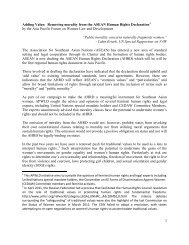A Digest of Case Law on the Human Rights of Women - Asia Pacific ...
A Digest of Case Law on the Human Rights of Women - Asia Pacific ...
A Digest of Case Law on the Human Rights of Women - Asia Pacific ...
Create successful ePaper yourself
Turn your PDF publications into a flip-book with our unique Google optimized e-Paper software.
CEDAW Country Ratificati<strong>on</strong> Report<br />
Republic <str<strong>on</strong>g>of</str<strong>on</strong>g> Korea<br />
Ratificati<strong>on</strong><br />
The Government <str<strong>on</strong>g>of</str<strong>on</strong>g> Korea ratified CEDAW <strong>on</strong> 27 December 1984 and enacted<br />
domestic legislati<strong>on</strong> [Treaty No. 855] <strong>on</strong> 7 January 1985 to give effect to <strong>the</strong><br />
C<strong>on</strong>venti<strong>on</strong>. Treaty No. 855 became operative <strong>on</strong> 26 January 1985.<br />
Reservati<strong>on</strong>s<br />
At <strong>the</strong> time <str<strong>on</strong>g>of</str<strong>on</strong>g> ratificati<strong>on</strong> Korea expressed reservati<strong>on</strong>s to Article 9 and Article<br />
16(1)(c),(d),(g) and (h) <str<strong>on</strong>g>of</str<strong>on</strong>g> <strong>the</strong> C<strong>on</strong>venti<strong>on</strong>.<br />
Article 9 provides for gender equality in both <strong>the</strong> nati<strong>on</strong>ality <str<strong>on</strong>g>of</str<strong>on</strong>g> children and for<br />
wives who follow <strong>the</strong> nati<strong>on</strong>ality <str<strong>on</strong>g>of</str<strong>on</strong>g> <strong>the</strong>ir husbands. The Government’s justificati<strong>on</strong><br />
for making this reservati<strong>on</strong> was <strong>the</strong> c<strong>on</strong>flict between Article 9 and <strong>the</strong> nati<strong>on</strong>ality<br />
laws <str<strong>on</strong>g>of</str<strong>on</strong>g> Korea which permit naturalisati<strong>on</strong> <str<strong>on</strong>g>of</str<strong>on</strong>g> foreign wives <strong>on</strong>ly toge<strong>the</strong>r with <strong>the</strong><br />
husband. The reservati<strong>on</strong> <strong>on</strong> Article 9 was subsequently withdrawn and was followed<br />
by <strong>the</strong> amendment <str<strong>on</strong>g>of</str<strong>on</strong>g> <strong>the</strong> domestic nati<strong>on</strong>ality law <strong>on</strong> 13 December 1997 to accord<br />
with <strong>the</strong> C<strong>on</strong>venti<strong>on</strong>.<br />
Article 16 provides for gender equality in family life. Reservati<strong>on</strong>s were made to this<br />
article because it c<strong>on</strong>flicted with <strong>the</strong> provisi<strong>on</strong>s <str<strong>on</strong>g>of</str<strong>on</strong>g> Korean Family <str<strong>on</strong>g>Law</str<strong>on</strong>g> which were<br />
biased in favour <str<strong>on</strong>g>of</str<strong>on</strong>g> <strong>the</strong> husband and fa<strong>the</strong>r. The reservati<strong>on</strong>s <strong>on</strong> Article 16(1)(c),(d)<br />
and (h) were subsequently removed <strong>on</strong> 15 March 1991.<br />
Article 16(1)(g) however, remains reserved. Children must follow <strong>the</strong> surname and<br />
origin <str<strong>on</strong>g>of</str<strong>on</strong>g> <strong>the</strong>ir fa<strong>the</strong>r as required by Article 781(1) <str<strong>on</strong>g>of</str<strong>on</strong>g> <strong>the</strong> Civil <str<strong>on</strong>g>Law</str<strong>on</strong>g> and a wife must<br />
be registered as <strong>the</strong> family <str<strong>on</strong>g>of</str<strong>on</strong>g> <strong>the</strong> husband under Article 826(3) <str<strong>on</strong>g>of</str<strong>on</strong>g> <strong>the</strong> Civil <str<strong>on</strong>g>Law</str<strong>on</strong>g>.<br />
Impact<br />
A number <str<strong>on</strong>g>of</str<strong>on</strong>g> laws in Korea have been amended or enacted in resp<strong>on</strong>se to <strong>the</strong> different<br />
articles <str<strong>on</strong>g>of</str<strong>on</strong>g> CEDAW.<br />
Article 1 <str<strong>on</strong>g>of</str<strong>on</strong>g> CEDAW, <strong>the</strong> definitive provisi<strong>on</strong> <strong>on</strong> discriminati<strong>on</strong> against women, was<br />
introduced in Article 2(1) <str<strong>on</strong>g>of</str<strong>on</strong>g> <strong>the</strong> <str<strong>on</strong>g>Law</str<strong>on</strong>g> <strong>on</strong> Prohibiti<strong>on</strong> <str<strong>on</strong>g>of</str<strong>on</strong>g> Gender Discriminati<strong>on</strong> and<br />
Relief 1999. This Act, in line with CEDAW, defines gender discriminati<strong>on</strong> as “all<br />
distincti<strong>on</strong>, exclusi<strong>on</strong>, or limitati<strong>on</strong> that is d<strong>on</strong>e for <strong>the</strong> reas<strong>on</strong>s <str<strong>on</strong>g>of</str<strong>on</strong>g> gender without<br />
reas<strong>on</strong>able basis, in exercising <strong>the</strong> rights or awareness and enjoyment <str<strong>on</strong>g>of</str<strong>on</strong>g> basic rights<br />
as human in all areas <str<strong>on</strong>g>of</str<strong>on</strong>g> political, ec<strong>on</strong>omical, social and cultural life”.<br />
Articles 2 and 3 <str<strong>on</strong>g>of</str<strong>on</strong>g> CEDAW: The gender equality principle has been part <str<strong>on</strong>g>of</str<strong>on</strong>g> <strong>the</strong><br />
C<strong>on</strong>stituti<strong>on</strong> <str<strong>on</strong>g>of</str<strong>on</strong>g> <strong>the</strong> Republic <str<strong>on</strong>g>of</str<strong>on</strong>g> Korea since its enactment. The C<strong>on</strong>stituti<strong>on</strong> states<br />
that all pers<strong>on</strong>s are equal before <strong>the</strong> law and that no <strong>on</strong>e shall be discriminated<br />
104



